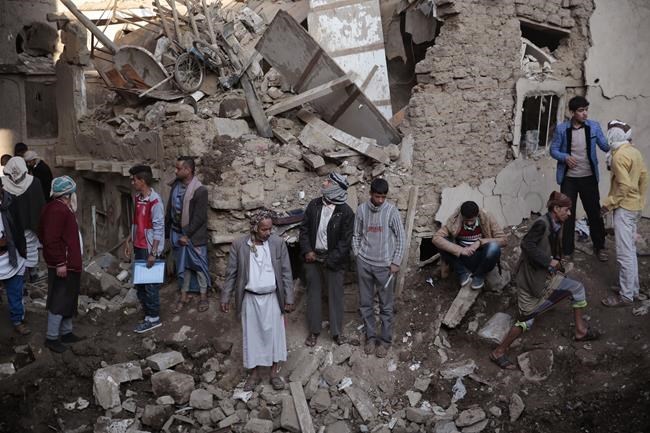
FILE - People gather at the site of a Saudi-led airstrike near Yemen's Defense Ministry complex in Sanaa, Yemen, Saturday, Nov. 11, 2017. The world must not lose sight of the plight of those living through the yearslong war in Yemen, Katharina Ritz, the International Committee of the Red Cross’ head of delegation in Yemen said Friday, March 11, 2022, urging continued aid for the Middle East's poorest nation as the war in Ukraine grabs the world's attention. (AP Photo/Hani Mohammed)
Republished March 16, 2022 - 11:40 AM
Original Publication Date March 16, 2022 - 1:36 AM
CAIRO (AP) — A United Nations appeal for Yemen Wednesday raised only $1.3 billion, less than a third of what the organization had targeted to help the Arab world's poorest country, the U.N.'s humanitarian chief announced.
Martin Griffiths called the total “a disappointment,” given that the U.N. had set out to raise $4.27 billion to help alleviate the world's worst humanitarian disaster. Some 161,000 people are likely to experience famine in Yemen in 2022.
"We hoped for more," he said in a somber tone at the end of the conference, calling the outlook for Yemen “dire.” The country, he said, "needs money, funding, urgent, rapid, in the bank to the people of Yemen.”
The conference came as world attention focuses on the war in Ukraine, which has overshadowed other humanitarian crises since the Russian invasion on Feb. 24 — raising concerns that that Yemen’s plight may be forgotten. Over 3 million people have fled Ukraine, in Europe’s largest exodus since World War II.
A prolonged conflict in Ukraine is likely to make it harder for Yemenis to meet their basic needs, as food prices, especially the cost of grain, are expected to increase. Yemen depends almost entirely on food imports, with 22% of its wheat imports coming from Ukraine, according to the World Food Program.
Griffiths said some nations did meet expectations. He was likely referring to Saudi Arabia and the United Arab Emirates, the pillars of a military coalition fighting the Iranian-backed rebels in Yemen.
“It is a disappointment that we weren't able as yet to get pledges from some we thought we might hear from,” he said. “We will be following up to see if we can increase this sum" to at least match last year's.
The 2021 conference raised only about $1.7 billion for Yemen out of $3.85 billion the U.N. had sought. However, the overall amount reached over $2.3 billion by the end of the year, according to U.N. Secretary-General Antonio Guterres.
U.S. Secretary of State Antony Blinken said the U.S. will donate nearly $585 million in aid to Yemen this year. He also called for an end to the grinding war.
“We have to work relentlessly to bring the conflict to an end, knowing that as long as it goes on, so will the humanitarian crisis,” he said.
Yemen’s war started in 2014 when the Iran-backed rebel Houthis seized the capital, Sanaa, and much of the country’s north. A Saudi-led, U.S.-backed coalition intervened months later to dislodge the rebels and restore the internationally recognized government.
The conflict has in recent years become a regional proxy war that has killed more than 150,000 people, including over 14.500 civilians.
The majority of Yemen’s roughly 32 million people live in Houthi-held areas. The rebels have for years been implicated in aid theft and withholding in extortion schemes.
U.N. experts earlier this year said they documented that the rebels provided or denied humanitarian aid to families “solely on the basis whether their children participated in fighting or to teachers on the basis of whether they taught the Houthi curriculum.”
The U.N. Office for the Coordination of Humanitarian Affairs, or OCHA, has warned that a total of 19 million people are expected to face acute food insecurity between June and December — an increase of around 20% compared to the first six months of 2021.
With the $4.27 billion, the U.N. aims to provide support to 17 million people in 2022, out of the 23 million who need aid, according to OCHA.
It said that half of the country’s health facilities are shuttered or destroyed. Yemeni currency, the rial, lost 57% of its value in 2021 in government-run areas, while persistent fuel shortages drove up the prices of food and other basic commodities in the Houthi-controlled north, OCHA said.
More than 4 million Yemenis have been driven from their homes; around one-fifth of newly displaced people in 2021 were in the energy-rich province of Marib which Houthis have attempted to seize for over a year, it said.
Ghalib al-Najjar and his family lives in the Dharwan camp on the outskirts the rebel-held Sanaa. The 48-year-old father, his wife, and seven children are at risk of famine amid price hikes and lack of humanitarian assistance.
“In the morning, half of us are fasting and I’m doing my best to provide food —if available -- to the others,” he said in a recent interview. “We live like ants on the ground or fish in the sea. We eat what we find on our way.”
The conference comes as peace efforts stall, with fighting escalating since the beginning of 2022. The Saudi-led coalition has stepped up its support to government ground forces to fend off the Houthis' offensive on Marib. Clashes have also intensified elsewhere, and the Houthis accelerated their cross-border attacks on Saudi Arabia and the United Arab Emirates.
Speakers from around the globe called on warring parties to de-escalate.
“We must address the underlying drivers of humanitarian need, break the cycle of violence, and change Yemen’s trajectory,” the U.N. chief said. “Allowing the war to continue is a choice. So is ending it. I appeal to the parties to choose peace.”
News from © The Associated Press, 2022